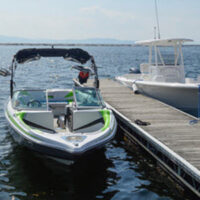If a Rented Boat Hits Me, is the Rental Company Responsible for Damages?

Recreational boating is very popular in the Tampa Bay area. Boaters can go out on the water almost literally twelve months a year. Unfortunately, many people who rent boats have little or no experience operating these watercraft. Florida has no boating license requirement. Operators under 21 must complete a boating safety course, but in many cases, these courses require no actual boat operation. People over 21 need not even complete this minimal requirement.
Generally, if owners allow incompetent operators to use their vehicles and these operators cause crashes, the owner is liable for damages. But these boat accident claims are quite complex, due to the nature of these wrecks and an obscure federal law.
Determining Operator Fault
Liability only attaches if the tortfeasor (negligent operator) was at fault to some degree. In car and truck crashes, this level of fault can be rather easy to establish.
However, since Florida has no boating license requirement, victim/plaintiffs must use circumstantial proof to establish incompetence. Such evidence includes things like:
- Tortfeasor’s statements about boating inexperience,
- Any evidence of impairment, such as alcohol or fatigue, at the time of rental,
- Tortfeasor’s unfamiliarity with the throttle and other basic boat operation systems,
- Weather conditions at the time (g. was a storm coming in), and
Many of these same issues also apply to the owner’s negligence, or lack thereof, as outlined below.
The Graves Amendment
In the early 2000s, lawmakers added a policy rider to a huge transportation bill. Politicians often use this strategy to pass bills which strongly favor special interests. That was certainly the case with the Graves Amendment. Congressman Sam Graves added this provision to protect vehicle rental companies, such as U-Haul and Enterprise, from large liability judgements. This provision has two basic requirements:
- Company was in the trade or business or renting motor vehicles, and
- Owner or agent was not otherwise negligent.
The first point is usually easy to establish in boating accident claims. But the second point is much harder to prove, so Graves Amendment immunity often does not apply in boat accident cases.
Generally, vehicle owners have a duty of care. They cannot rent vehicles without asking questions. In fact, among Enterprise and other such vehicle rental companies, it is the industry standard to verify that a drivers’ license is valid. So, if the owner or agent does not make any inquiries about boater competency or there is any evidence of incompetency, as outlined above, Graves Amendment immunity may not apply.
If liability attaches, the vehicle owner is responsible for both economic losses, such as medical bills, and noneconomic losses, such as pain and suffering.
Work with Tenacious Lawyers
Get justice from your boating injury. For a free consultation with an experienced Tampa boating accident attorney, contact The Matassini Law Firm, P.A. You have a limited amount of time to act.
